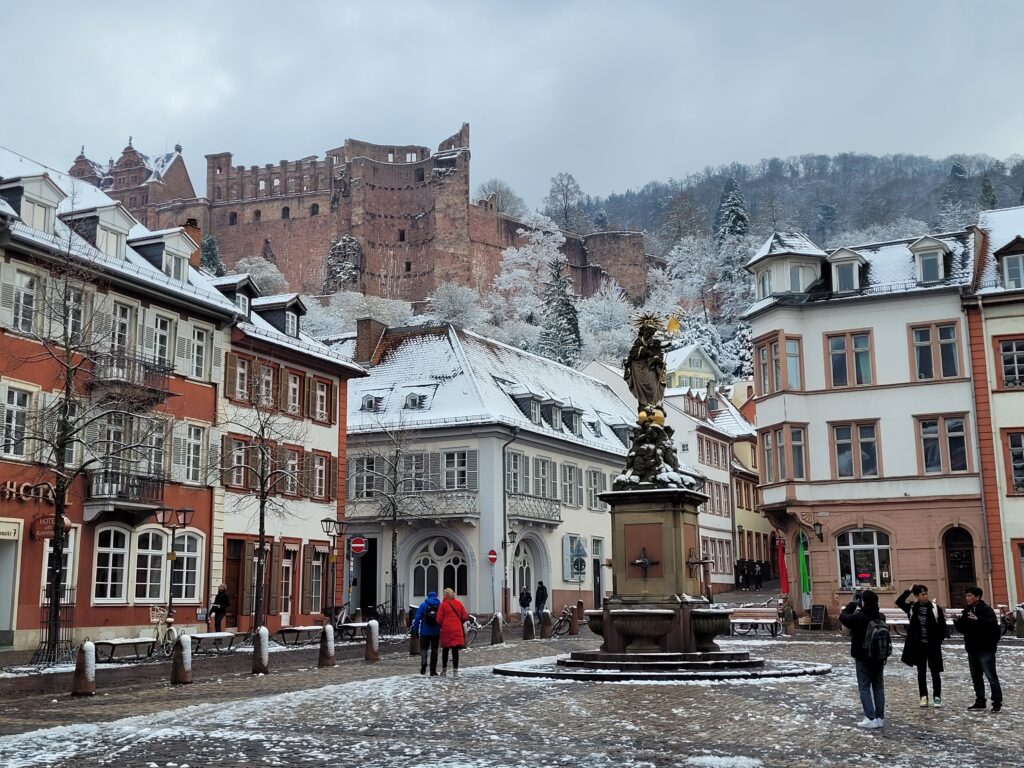Simon John –
In the first semester of 2022/3, I was on research leave from Swansea, which enabled me to take up a visiting fellowship at the Käte Hamburger Centre for Apocalyptic and Post-Apocalyptic Studies (CAPAS) at the University of Heidelberg in Germany. The aim of the Käte Hamburger Centres – a number of universities in Germany host them – is to bring together academics from around the world and from a variety of disciplines collaboratively to explore a common research theme. CAPAS focusses ‘on the effects of catastrophes and end-time scenarios on societies, individuals, and environments’ (see the Centre’s homepage). Each fellow at CAPAS pursues a research project on this theme, coming at the subject from their own unique scholarly background, and applying their distinct expertise. Other fellows this academic year include literature specialists, philologists, a film studies expert, political scientists and experts in digital humanities.

My CAPAS project was entitled ‘The crusades and apocalyptic thought in the Middle Ages’. It centred upon a trilogy of chansons de geste (poetical texts written in vernacular French from about 1200) that recount the history of the First Crusade (1095-99). My aim was to explore these texts as a way of interrogating how secular armsbearers in Christian Europe may have thought about the Endtimes in connection to the crusades in the twelfth and thirteenth centuries. This, I anticipate, will offer a corrective to previous work that explores this theme largely by using Latin chronicles written and read by ecclesiastics. During my time in Heidelberg, I carried out a preliminary appraisal of these three texts, while working to situate them into the broader medieval thoughtworld concerned with ideas about the Apocalypse. I also devoted time during the fellowship to assessing relevant historiography, enabling me to locate my work in the context of recent trends and debates in historical writing on perceptions of the Apocalypse connected to the crusades. I made significant progress in my planned research, and will complete my work in the months ahead. I presented some of my preliminary findings in a lecture in Heidelberg in November 2022; this formed part of CAPAS’ semester-long lecture series, to which all fellows contributed. The lecture was delivered in person, but was also livestreamed and recorded via YouTube.
My time at CAPAS was inspiring and enlightening. As part of my work, I explored medieval concepts of the Endtimes, and engaged with the ideas and perspectives with the broad range of academics based at the centre. Through that work, I was able to build up a much fuller understanding of Apocalyptic thought, reaching a level that far transcends the medieval Christian context with which I began the fellowship. Above all, my experience drove home to me the potential of bringing together cross- and intra-disciplinary perspectives around a common theme. In my view, scholars stand to benefit immeasurably from gaining new insights, and learning about alternative and potentially productive disciplinary approaches.
Beyond CAPAS, I had during my fellowship in Heidelberg sustained contacts with medieval historians based there. With Dr Wolf Zöller and Dr Alexander Marx I organised the conference ‘Exegesis, Sermons, Liturgy: New Pathways in Crusade Studies’, which was held online on 3-4 November 2022. The conference focussed on emerging and fast-evolving areas of scholarship in crusade studies; most speakers were either PhD students or early career scholars working at their cutting edge. The conference featured keynote papers from Jessalynn Bird (Saint Mary’s College, Notre Dame, USA) and Jay Rubenstein (University of Southern California, USA). We intend to publish a volume of proceedings based on this conference. Moreover, on 7 December 2022 I made a guest teaching appearance on Dr. Marx’s course ‘The Bible in Crusade Sources: Papal letters, chronicles, sermon texts’, leading a seminar on ideas about crusading and the apocalypse.
My research leave was highly stimulating and productive. I anticipate that a number of initiatives commenced in Heidelberg will continue to hold my attention for quite some time after my return to Swansea. So, colleagues and students can expect me to be talking about the Apocalypse in the months ahead.


